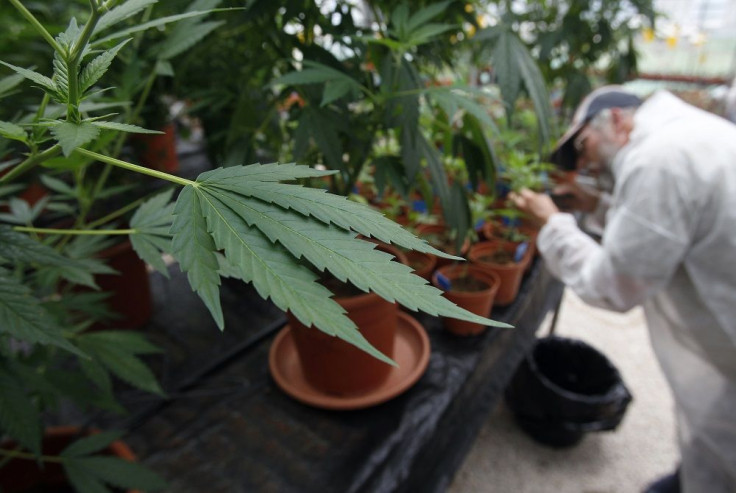Israel stands at the centre of the global cannabis market, but it comes with a small but major problem

While the US still fights for federal marijuana legalisation, Israel seems already to have gone a long way. The 60-year-old nation, despite being beleaguered by wars and almost-nil natural resources, continues to become a global startup hub . Among the many industries booming and advancing in this country is the cannabis segment.
This is possible because the country has been conducting research and development enterprises on medical marijuana since the 1960s. It was also the decade when Professor Raphael Mechoulam , Israel’s most revered cannabis researcher, began his works on discovering the weed’s unknown potential. Mechoulam’s successful synthesisation of cannabidiol (CBD) and tetrahydrocannabinol (THC) has opened doors to future clinical trials on medical marijuana in and outside Israel.
The cannabis culture in Israel is different, too. Israelis are more open when it comes to innovation, which also explains the unstoppable growth of new and small markets in the country. Its government has also been consistent in boosting its support for marijuana ventures through progressive medical marijuana programmes that have been an envy of the world.
"Israel doesn’t view cannabis with the stigma and staunch propaganda lens we see here in the U.S. That’s why American companies turn to Israeli researchers and organizations—and now Mechoulam works with some of the top U.S. companies developing cannabinoid drugs and products,” wrote Zoe Wilder of cannabis-focused publication Merry Jane.
According to Saul Kaye, CEO of Israel-based marijuana firm iCan and the organiser behind the global marijuana conference CannaTech , it’s all about the “Jewish psyche,” a trait that enables Israeli businessmen to both thrive and survive amid seemingly endless political and economic crises.
“The harder we are squeezed, the finer [cannabis] products we produce. [The army training] drives entrepreneurship and fosters young minds to continually question and improve the process. This translates directly to the success of Israel in so many fields from medical, agrotech, biomed, security and pharma,” he told Observer.
Its size also works to its advantage as, unlike humongous America, it’s easier for the government to conduct tests on determining whether marijuana would be embraced by the community or not. That said, protocol and obstacle on marijuana have been almost superfluous. “The clinical trials that we have to date here in Israel are based on the actual experiences of children in our community,” continued Kaye.
All these key points put Israel under the global spotlight and have also attracted US firms that have just recently emancipated from long years of prohibition. Many US-based marijuana companies are now flocking to Israel to enjoy the nation’s almost-free R&D milieu. The amount of money being invested by American firms in this segment alone is now expected to grow to $100 million (AUD$130 million) in the next years to come. Should US firms decide to put up their own presence in the country, this amount will balloon further.
"In the United States it's easier to study heroin than marijuana. With marijuana you have to go through added layers of government red tape. It highlights the way marijuana research is being shackled by politics," U.S. psychiatrist Suzanne Sisley told Reuters.
Behind this is a known, if not totally unique, American trait. US entrepreneurs are seekers of quality, and they are willing to spend money just for them to obtain perfection and provide high-quality products to their consumers. However, this doesn’t only go with giant, established firms that have the means to do it. Startup Med-X, for instance, has resorted to equity crowdfunding to expand its brand reach, research, and advocacies concerning educating the public on cannabis usage’s many benefits. The small firm known for its 100-percent natural product aims to become a leader in revolutionising a nascent industry.
"We are offering this chance to reserve shares through an equity crowdfunding campaign to give all Americans the chance to be a part of a positive phase in the rapidly evolving cannabis industry," said Dr. David Toomey, CEO of Med-X, in a press statement . "We see tremendous growth potential for the industry at large with both medical and recreational users, as well as a tremendous need for products that the public can trust not to be contaminated with pesticides, mold, or other problematic substances."
A major quandary
There’s no doubt that Israel is now the king of cannabis R&D. Still, a market cannot thrive on just exporting its expertise or welcoming foreign companies alone. For it to expand quickly, its product must be seen and tested by the global market. And this is where the problem begins, explained Anne-Marie O'Connor of The Washington Post.
"Israel has become a world leader in science on the medical uses of marijuana, and its producers could become major exporters of medical cannabis, experts say. But so far, the government has allowed them to export only their knowledge — not the actual product,” she wrote. “For now, the inability to export is setting limits on the industry’s ambitions. When the health minister from the Czech Republic visited last year, he was unable to get a deal to import Israeli cannabis.”
It could be an alarming situation for Israel. Exporting knowledge is nothing different from granting the world a free access to its many secrets and would-be advantages over its future competitors.
Indeed, US can be one of them, but if one talks of global market it’s all about competing with everyone. Surely, we might see successful foreign partnerships, but judging by how Israel deals with the matter, seeing a global Israel-based cannabis product someday remains blurry. Of course, it’s too early to say.





















